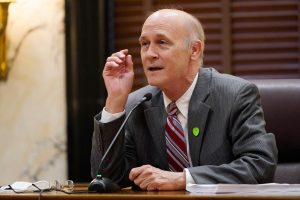Nearly three decades have elapsed since Dick Molpus, former Mississippi secretary of state, helped revive the state’s ballot-initiative process. The years have done little to temper his zeal for the process.
“This is all about power,” the Neshoba County native told the Mississippi Free Press in a May 18 interview. The initiative process was borne out of “frustration with the good ol’ boy network at the Legislature, recalcitrant towards any positive change. Citizens felt like they were ignored, that their voice didn’t count. … This was our escape valve for when representative democracy failed.”
Sen. Hob Bryan, D-Amory, can match Molpus’ enthusiasm, but with a markedly different perspective on the ballot initiative. On May 17, the Mississippi Free Press asked the senator, now in his fourth decade in office, for his thoughts on a special session to restore the right to direct democracy in the state.

“Oh Lord, I hope we would not do that. The initiative process is a bad idea. It’s a terrible way to make public policy, and it’s absurd to have initiatives only for constitutional amendments,” Bryan said. The veteran senator, who has served on the state’s Constitution Committee for the majority of his career, has a far less noble take on the history of the ballot initiative than Molpus does: “The only reason we have this initiative (process) is because the whole world went crazy over the lottery. Period.”
The split between Molpus and Bryan, both prominent Democratic politicians, reveals much about the stunning May 14 Mississippi Supreme Court decision to scrap the entire ballot-initiative process on a generation-old technicality. The split is not strictly partisan. Democrats and Republicans alike have called for the swift reinstatement of the ballot initiative. Others in both parties have expressed reservations about a rapid return to Mississippi’s blossoming era of direct democracy.
With immense public pressure—and scorn—following the decision to scrap a wildly successful campaign for a medical marijuana program and the entire initiative process alongside it, it seems likely that Mississippians will have access to some form of initiative and referendum process by the end of next year. But both the reasons for the initiative’s return in the 1990s and the explanation for the Legislature’s failure to adapt the process after the state lost its fifth district remain a subject of debate.
‘I Wasn’t Shocked’
Sen. Bryan’s distaste for the ballot initiative as a mechanism for creating policy is as plain as day. But the senator asserts that his disagreements in principle were not the reason for his committee’s lack of action on revising the district requirements that would eventually lead to the initiative process’ demise.
“As a practical matter, what happened was there was an attorney general’s opinion that said you get initiative (signatures) from the old districts. Everybody just did that, based on the AG’s opinion. And that’s why I think it probably was not an issue,” Bryan said.
Former Attorney General Mike Moore, who served from 1988 to 2004, was traveling and could not respond to a request for comment before press time, but an opinion from then-Attorney General Jim Hood in 2009 acknowledges the mathematical impossibility of collecting no more than 20% of the required signatures from any one district and presents no clear remedy beyond a constitutional amendment.
“We are aware of the difficulties circuit clerks and their staffs may encounter when attempting to verify the congressional district under a previous redistricting plan of large numbers of initiative petition signers. One remedy to this problem would be to amend Section 273 to reflect four congressional districts,” Hood wrote then.
Moore, though, may have taken a more expansive approach, being a dogged supporter of direct democracy.

“Mike is my ally and my friend, but he originally proposed that you would need only 7,500 signatures to begin the initiative process,” Molpus acknowledged, laughing. “I thought that was reckless.”
Sen. Joey Fillingane, R-Sumrall, was not among those surprised by the court’s decision to decapitate the ballot initiative in Mississippi. “I really wasn’t shocked,” he told the Mississippi Free Press in a May 18 interview. “I was the primary sponsor of the voter ID initiative back in 2011, and that question came up. We had not really had a bunch of initiatives come up until that time.”
In fact, Fillingane underestimates his own awareness of the problem. He was the first legislator in Mississippi to draft a bill that would have avoided 2021’s catastrophic end to Initiative 65—all the way back in 2002, the year Mississippi formally lost its fifth district.
That bill was one of countless attempts to address the district problem, including that of current Secretary of State Michael Watson himself in 2015, in his capacity as a state senator. Most of the attempts to update the ballot-initiative process tinker with some other elements of Section 273, variously making it harder or easier to get a constitutional amendment on the ballot, but all acknowledge the ultimately relevant technicality that Mississippi no longer has five districts to source signatures from.
What the attempts also have in common is a failure to proceed out of committee, all of them dying on the vine without a serious attempt to debate or pass them in the House or the Senate. Fillingane acknowledged that the Legislature had failed, and chalked it up to tight deadlines and sparse usage of the initiative process.
“The Legislature tends to be a very short session: 90 days in some instances or less. Once you get there, you get hit from all directions with the budget issues, bond issues, all the legislation: it’s just a couple of weeks to request the bills … and deal with them in committee,” Fillingane said.
Ballot initiatives are rare, and the district issue was a technicality, Fillingane added. “All that sounds like a bunch of excuses, and it probably is. But it’s just a rush—a blur—and these initiatives don’t happen that often. (Still,) we should have addressed it,” he said.
An ‘Inane’ Provision
When this reporter informed Sen. Bryan that many statewide leaders were calling for a special session to address the broken ballot-initiative process, the senator responded with a long, agonized sigh. Whether Bryan returns to the Legislature this year or in 2022 for the next regular session, it is clear that he will support measures to limit the scope of the ballot initiative process.
“It’s absurd to have this provision only for amending the constitution. And that is an outgrowth of the fact that the lottery prohibition was in the constitution. That is why we have such an inane provision,” Bryan said.
Mississippi is indeed one of a small handful of states that could only amend the constitution by ballot initiative, rather than writing lesser statutes into law through direct voting. Only Florida and Illinois shared this configuration.

Perhaps ironically, Molpus and Bryan agree on the absurdity of the constitutional amendment-only system, though for entirely different reasons.
To Molpus, the Legislature refused to allow statute initiatives because that process would be simpler than amending the constitution. “It’s much harder to amend the constitution than it is to change a statute. And this was just trying to limit the force of the initiative (process),” Molpus said.
Mississippi had numerous limitations on its ballot initiative process, including the restriction on statutory amendments, the requirement for signatures from all of the state’s districts, and the Legislature’s power to pass “alternative” amendments. Alternative amendments, like Initiative 65A, the legislative option that accompanied Initiative 65 last year, muddy the public’s understanding of which vote accomplishes which outcome. Molpus sees all of these limitations as impediments to the principles of direct democracy that the ballot initiative is intended to provide.
“Ballot initiatives undermine (legislators’) power and their authority to make the laws that we live under. If you allow the citizens the right to go around a recalcitrant legislature, it weakens the Legislature and empowers the citizenry,” Molpus said, adding that the need for direct democracy was as great today as it was in the 90s. “(But) those people who did not want the citizens to do away with representative democracy, essentially, made it more difficult,” Molpus said.
Bryan is one of those people—and the senator is characteristically unapologetic about it.
“I think the people of Mississippi should elect state legislators who will vote the way they want them to vote. If the people of the Mississippi want, for example, public education, public roads, or Medicaid expansion, maybe they could elect officials and legislators who would support those things,” Bryan said.
“But we had a pretty good election. It was pretty clear which candidate was for public education. It was pretty clear which candidate was for highways. It was pretty clear which candidate was for Medicaid expansion. Apparently, the voters are shocked to find that the incumbent governor is actually following through with the policies he had in his election campaign,” the senator finished.
Eminent Domain Restrictions at Risk
The decision that ripped apart Initiative 65 also potentially called into question every ballot initiative passed since 2002, accomplished with the flawed signature-gathering process. While Initiative 65 is firmly dead, and the plethora of prospective ballot initiatives—including Medicaid expansion—cannot proceed without an updated ballot-initiative procedure, the outcomes of most of the earlier ballot measures are not at risk, Fillingane said, because they triggered independent legislative actions that then wrote them into law.
“It would have been affected, obviously, if the initiative had been all we did, but we came back in after that and actually addressed the law, as it relates to voter ID (for example), and put that into statute,” Fillingane said. Thus, neither the new state flag nor Mississippi’s voter ID laws are subject to repeal by the same decision that killed the medical marijuana program.

There is one key exception: restrictions on eminent domain. In 2011, Mississippians voted to ban “taking private property by eminent domain and then conveying it to other persons or private businesses for a period of 10 years after acquisition,” effectively blocking the state or municipalities from using eminent domain for the purposes of economic development.
This restriction remains in the state’s constitution, however, no follow-up legislation would remain if the Mississippi Supreme Court were to strike it down on the same grounds as Initiative 65.
“I don’t want to predict what would happen, but it does not seem to be as safe as voter ID is, because I don’t believe that legislation followed that initiative,” Fillingane said.
Statewide Leadership Weighs In
As of press time, top statewide leadership has weighed in on the prospect of a special session to address the initiative process and the medical marijuana program, which the court’s decision derailed.
Secretary Watson is the most directly supportive of a simple and unadorned fix to the initiative process, releasing a statement that called for a special session to fix the initiative process immediately.
“I filed a concurrent resolution to amend Sect. 273(3) of our constitution in 2015, and strongly encourage my former colleagues to do so again. By changing the words “one-fifth (⅕) to, “its pro-rata share,” Mississippians will regain the ability to change our constitution no matter the number of congressional districts we have,” Watson wrote.
“I strongly encourage Gov. Reeves to call a special session to address the issue,” Watson concluded, adding that the Legislature should draft bills retroactively confirming past ballot initiatives—like eminent domain—that the decision could imperil.
House Speaker Philip Gunn, R-Clinton, joined Watson in his support of a special session, issuing a statement to that effect.
“We 100% believe in the right of the people to use the initiative and referendum process to express their views on public policy. If the legislature does not act on an issue that the people of Mississippi want, then the people need a mechanism to change the law. I support the Governor calling us into a special session to protect this important right of the people,” Gunn wrote.
Lt. Gov. Delbert Hosemann at first appeared the most measured in his assessment of a special session, suggesting that the issues may be better addressed in the regular session in 2022.

“Citizen-driven ballot initiatives are an important part of policy-making, and I support reenacting the ballot initiative process. I also support a medical marijuana program, as evidenced by the Senate twice passing back-stop legislation which did not survive in the House. We are in the process of talking to Senators about the Supreme Court ruling as it relates to both issues and how to proceed,” Hosemann wrote in a statement.
“If the Governor chooses to call the Legislature back into Special Session, the Senate will be ready. Because Special Sessions are expensive, my preference is to approach this situation in an organized fashion so when we do return we can minimize costs to taxpayers,” he concluded.
But by press time, Hosemann had expressed more direct support for the process—and outcome—of the ballot initiative and the medical marijuana program, telling WJTV’s Thao Ta that he “strongly favors” the initiative process.
In this instance, it is Gov. Tate Reeves who holds all the cards. The governor alone possesses the authority to call a special session. Additionally, he has the power to strictly limit what can be addressed at the session, down to the individual sections of Mississippi code at stake.
In an interview with conservative news blog Y’all Politics, Reeves mulled over the issue, indicating his support for a special session intended to protect ongoing plans for some form of medical marijuana in the state—but not necessarily a mended ballot initiative process.
“Changing the initiative process cannot happen overnight,” Reeves said.
Editor’s note: Dick Molpus is a past donor to the Mississippi Free Press, which did not influence the above reporting.










